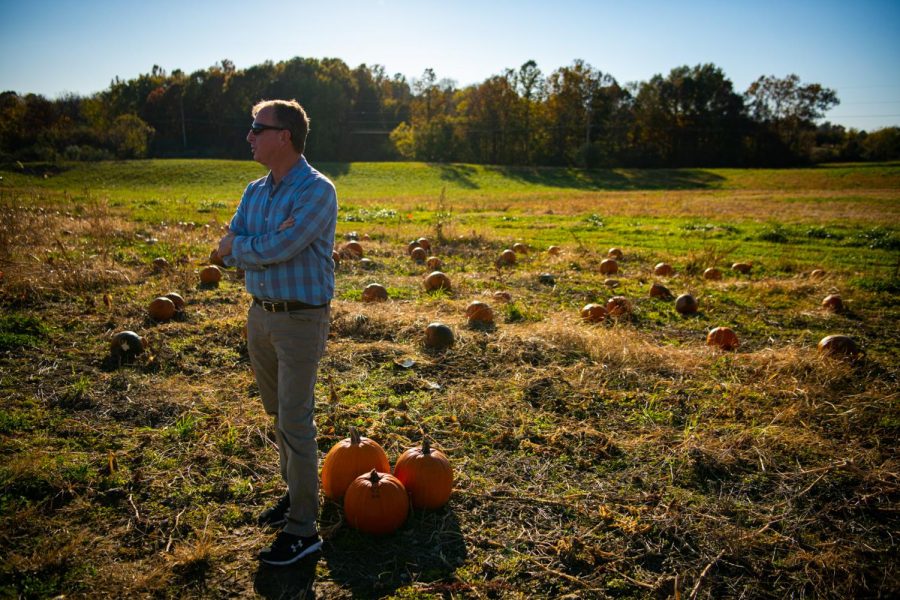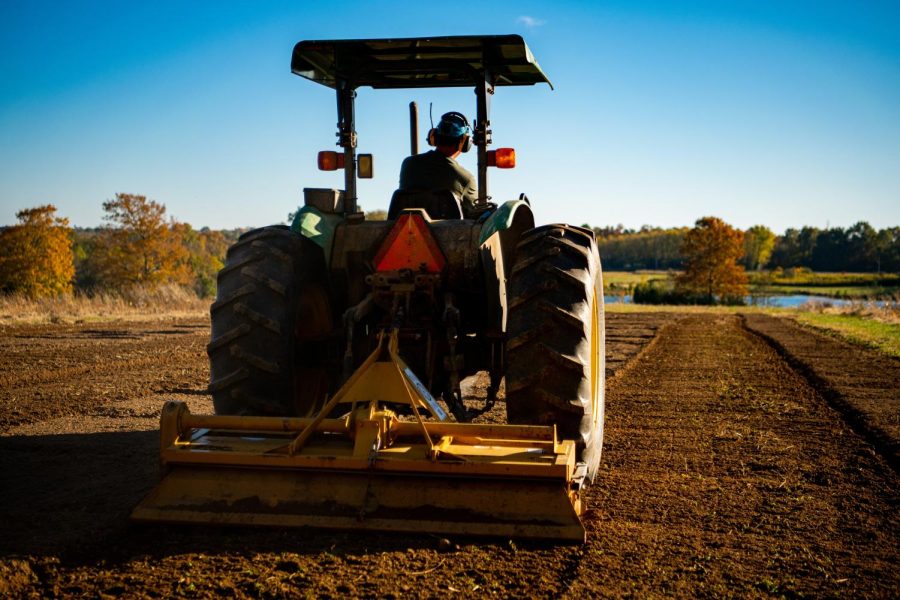SIU Professor Alan Walters working to develop heat tolerant pumpkins
SIU professor, Alan Walters, stands in the pumpkin fields at the Horticulture Farm on Monday, Nov. 8, 2021. Dr. Walters, who is a professor of Vegetable Science and Breeding in the Department of Plant, Soil and Agricultural Systems, is researching how to get pumpkins to grow bigger in hotter climates.
Professor Alan Walters, a professor of Plant, Soil and Agricultural Systems has been working to create heat tolerant pumpkins that can grow in warmer climates.
Walters teaches vegetable science and breeding and has been at SIU for twenty-three years.
The ideal temperature to grow pumpkins is between 75 and 85 degrees. Once temperatures get above that, pumpkins tend to not thrive.
Advertisement
Illinois is the leading state in pumpkin production and there are plenty of other uses for pumpkins, aside from Halloween carving and Thanksgiving pie Walters said.
“Pumpkin seeds, pumpkin seed oil, pumpkin granola, pumpkin fruit bars, ” Walters said. “In some countries they produce pumpkin seed oil, and use it on a salad instead of your typical salad dressing.”
Walters said his research will benefit farmers in Southern Illinois as the region gets increasing summer temperatures.
“Once it gets above 95-100 degrees, a lot of times we get that in the summertime, it really affects fruit setting,” Walters said.
Fruit setting is the process where flowers become fruit and their size is determined.
Walters said that if the climate keeps increasing in temperatures, farmers must have crops that can still produce under those high temperature strains.
“The media really wants to talk about climate change and how it’s going to be impacting us here in the next 150 or 200 years,” Walters said. “If the climate keeps increasing in temperatures, we have to have crops that can still produce under those high temperature strains.”
Advertisement*
Walters has assisted farmers in Kabul, Afghanistan and Austria to promote growth of their crops and maintain healthy soil levels.
Walters is going to Brazil on a Fulbright which is a scholarship grant for teachers to do research abroad to work on severe environmental issues such as lack of pollination and pollinator decline.
Walters said he is trying to develop better varieties of pumpkins than what is on the market right now.
“We should get higher yields with these varieties, because they’re going to set more fruit than what we normally would expect to see on a lot of the other pumpkin varieties that we grow,” Walters said.
The research included fertility trials, cover crop trials and weed control trials to try to increase the productivity of pumpkins. Walters studied how fertilizer treatment, adequate pollination and water regulation also aid pumpkin growth.
“You have to have just the right amount of water for pumpkins at the right time for them to grow,” Walters said. “You don’t want too much water. You want adequate amounts of water because if there’s too much water you’re going to get a lot of other fungal diseases.”
Shape and size are also taken into consideration, keeping in mind consumers appreciate pumpkins’ aesthetic qualities.
“Consumers are not going to buy a crappy looking pumpkin, so you have to make sure that the size is what the consumer is going to want to purchase,” Walters said.
The pumpkin research can also be applied to other vegetables, such as tomatoes.
“Tomatoes, which are very similar to pumpkins, once the temperatures get above a certain range, they start to drop the fruit,” Walters said. “So, it’s applicable to a lot of different crops to develop these more hot-tolerant abilities for a plant to set fruit.”
While in Brazil, Walter said he’ll be helping small growers address pollination issues for melons.
Staff reporter Joel Kottman can be reached at jkottman@dailyegyptian.com and on Twitter: @JoelKottman
To stay up to date with all your Southern Illinois news, follow the Daily Egyptian on Facebook and Twitter.
Advertisement














